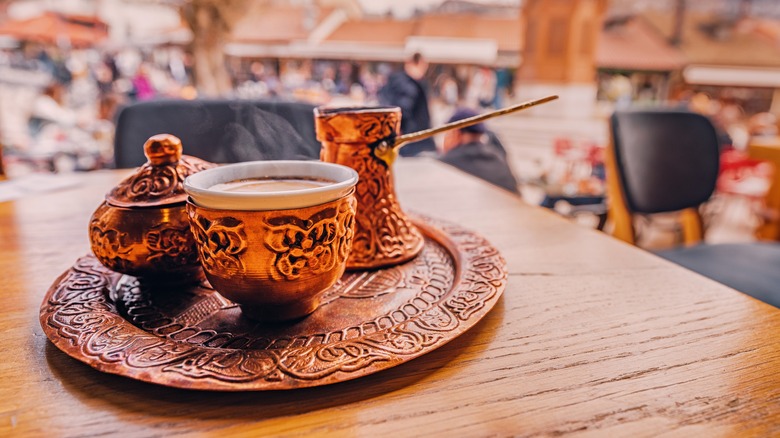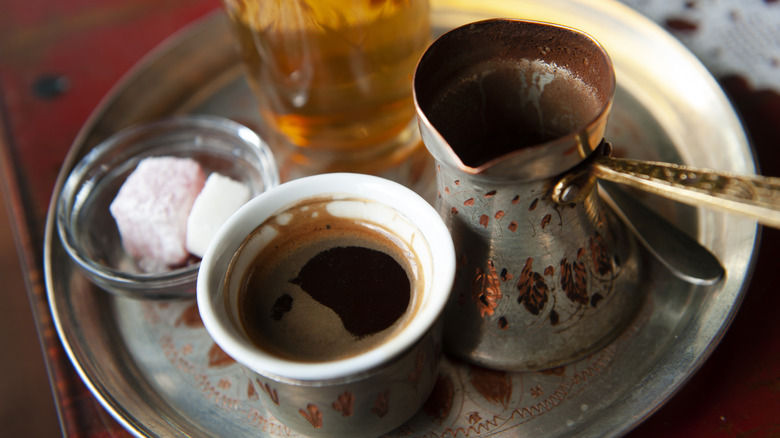If You're Stirring Sugar Into Bosnian Coffee, You're Doing It Wrong
When international coffee aficionados mention the bean style of Bosnia and Herzegovina, it's often followed by some mention of the perhaps better-known Turkish coffee. Balkan coffee isn't dissimilar to Turkish coffee, but it's wildly different in crucial ways that make these two java classes totally unique and independent from each other — namely, the sugar.
Bosnian coffee totes a distinctive flavor, simultaneously strong, dark, robust, and bittersweet. Its hallmark is an ultra-thick texture produced by multiple boils in a small, long-handled copper coffee pot called a džezva. Finely ground coffee is boiled in water until the combination begins to foam. Then, the pot is removed from the heat until the foam drops, and is brought back up to a thick foaming boil again. This can be repeated more than twice for richer thickness. Finally, a small bit of boiled water is added again post-brew, creating more foam and intensifying flavor.
Unlike Turkish coffee, sugar is not added to Bosnian coffee until after brewing. Traditionally, it's served in a copper mug called an ibrik with a small dish of sugar cubes. As many cubes as desired are placed in the bottom of the mug, then topped with the hot coffee and allowed to sit until the sugar dissolves. Alternatively, some sippers sweeten their brews not by dissolving sugar into the coffee but by biting a small piece of sugar off each cube, placing it under their tongue, then allowing the sugar to dissolve in the mouth while sipping rather than in the cup.
Sugar cubes are the not-so-secret ingredient
Coffee in Bosnia is a cultural ritual with a fittingly ritualistic method of preparation. Take, for instance, the utilitarian and aesthetic qualities of the coffee-brewing tools. If you don't have a džezva on hand, a small saucepan on the stove will get the job done. But the narrow spout of the džezva helps keep all those gritty grounds tucked inside the pot instead of floating in your cup of coffee. The copper-plated coffee pot retains heat for a longer period of time, so sippers can leisurely enjoy their brew without rushing to a tepid finish. This is an especially important attribute, considering coffee drinking in Bosnia is typically a social event, an opportunity for connection, conversation, and deliberately slowing down, no cell phones involved (usually). The džezva is also imprinted with intricate designs and hand-hammered motifs depicting Bosnian landscapes, symbolizing its cultural importance. Bosnian coffee is also served in small fildžan cups made from copper or ceramic, which further facilitate slower sipping and even heat distribution.
Coffee culture was cemented in Bosnia as early as the 1600s when the rulership of the Ottoman Empire outlawed alcohol, leading folks to turn to coffee as the dominant social beverage. Today, coffee in Bosnia remains a pillar of community, philosophy, hospitality, generosity, and contemplation. It's enjoyed in the morning and afternoon, often with rahat lokum, aka Turkish Delight, a fragrant jelly candy made with rosewater. Although modern Bosnian coffee-lovers also enjoy European-style espresso, as well.

